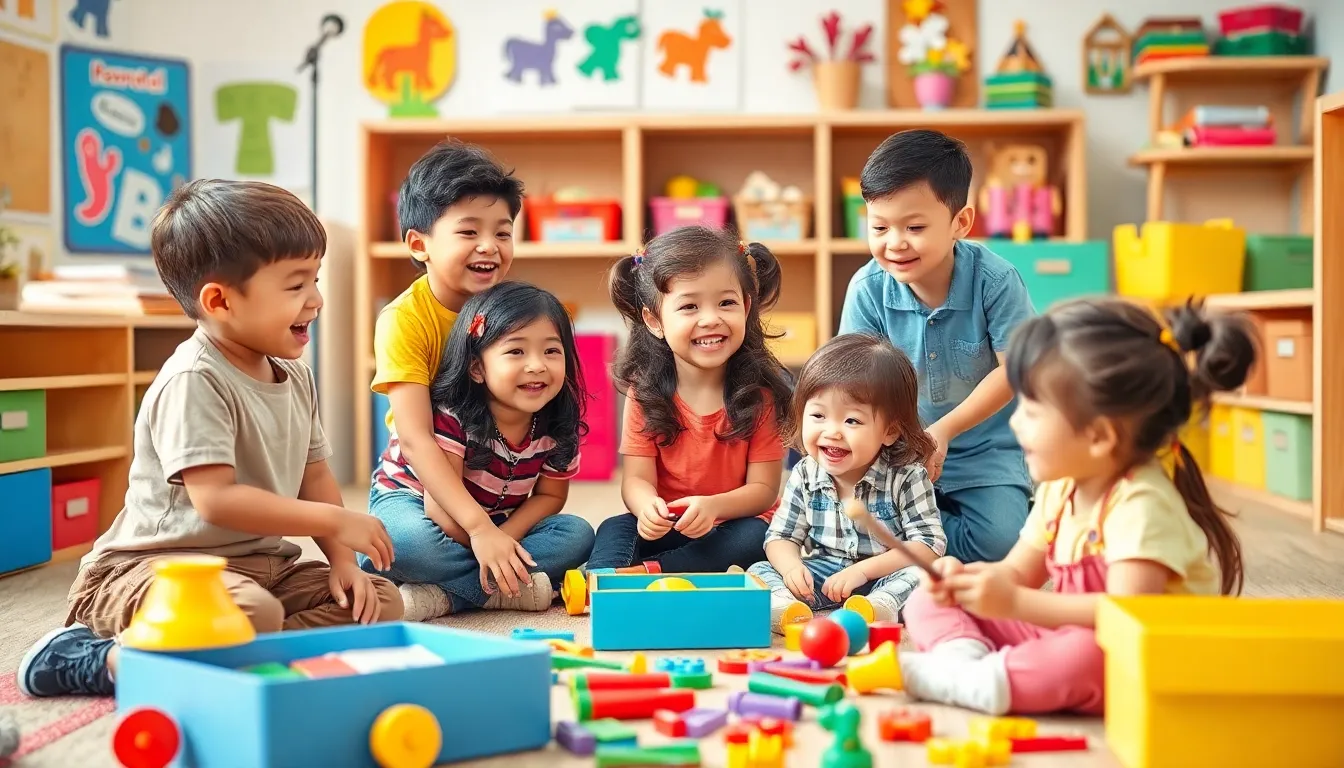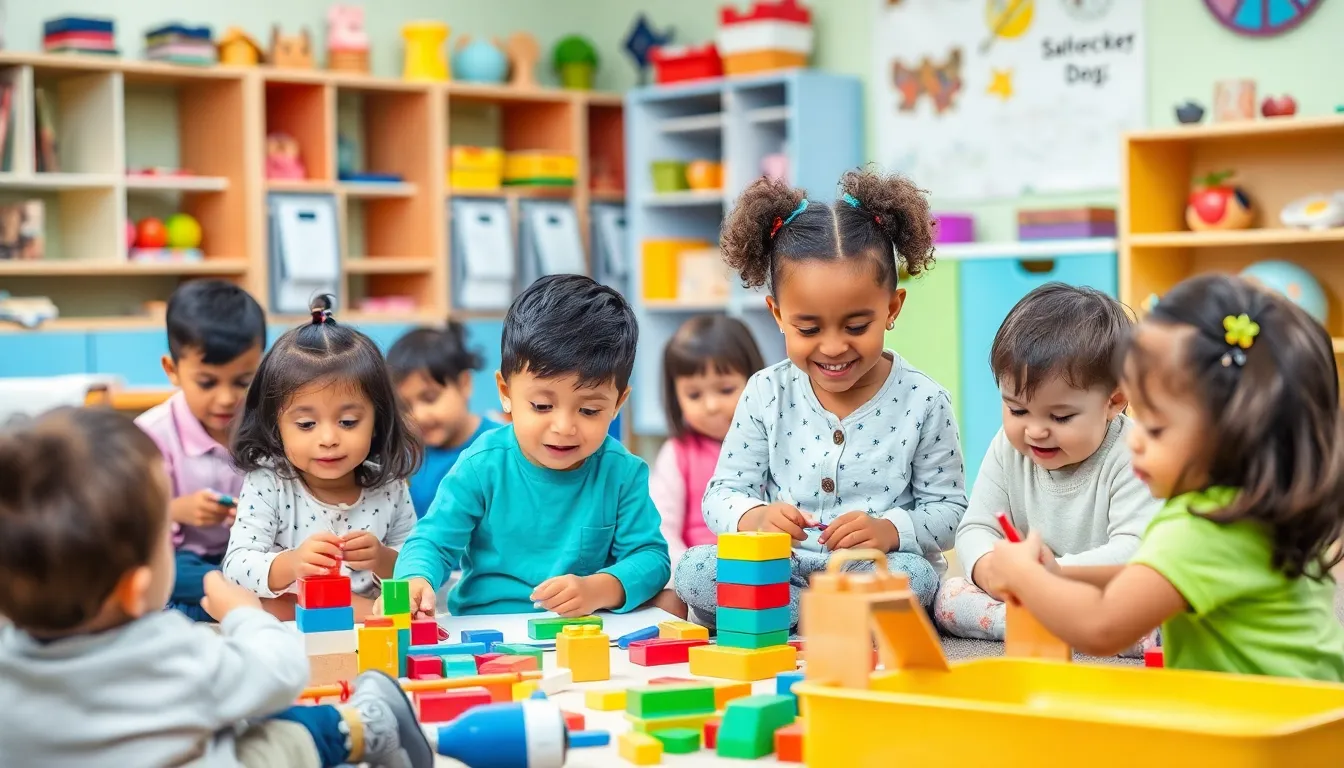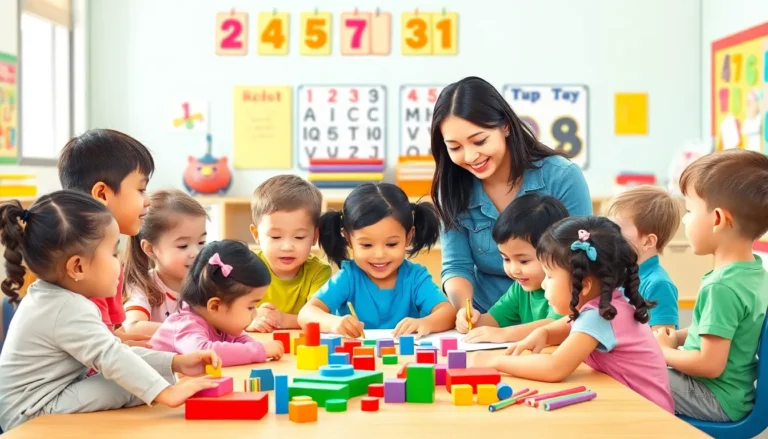Table of Contents
ToggleIn the Show-Me State, where the rivers flow and the barbecue sizzles, the Missouri Early Learning Standards are like the secret recipe for a successful childhood. These guidelines aren’t just a bunch of fancy words—they’re the roadmap for nurturing young minds. With a focus on developmentally appropriate practices, they ensure that kids aren’t just playing but learning in a fun and engaging way.
Imagine a world where toddlers can explore their creativity while mastering the art of counting. That’s what these standards aim to achieve. They set the stage for educators and caregivers to foster a love for learning right from the start. So, whether you’re a parent, teacher, or simply a curious bystander, understanding these standards can make a world of difference in shaping bright futures. After all, who wouldn’t want to be part of a journey that turns tiny tots into tomorrow’s trailblazers?
Overview of Missouri Early Learning Standards
Missouri Early Learning Standards serve as a foundational framework for early childhood education, guiding the developmental trajectory of young children. These standards facilitate an environment where children can engage in play-based learning, crucial for both cognitive and social development.
The guidelines focus on essential domains, including language and literacy, mathematics, and social-emotional development. Each domain contains specific expectations that educators and caregivers can use to assess children’s progression and plan appropriate activities.
Creativity forms a core component, encouraging children to express themselves through various media such as art and storytelling. This aspect strengthens children’s problem-solving abilities and critical thinking skills.
Furthermore, the standards support the cultivation of foundational skills like counting and letter recognition, integral for future academic success. By emphasizing these skills, Missouri Early Learning Standards help instill a lifelong love for learning.
Collaboration among parents, teachers, and early childhood educators enhances the implementation of these standards. Understanding the objectives allows stakeholders to create engaging and developmentally appropriate learning experiences.
Additionally, the standards promote closure of opportunity gaps by ensuring equitable access to quality early education programs. Through adherence to these guidelines, Missouri aims to provide an enriched learning environment that fosters holistic development in all children.
Importance of Early Childhood Education

Early childhood education plays a crucial role in a child’s development and learning process. Focused guidelines like the Missouri Early Learning Standards create structured opportunities for growth.
Benefits for Children
Children gain numerous advantages from early childhood education. Developmentally appropriate practices enhance cognitive, social, and emotional skills. Encouraging creativity fosters problem-solving abilities and instills a love for learning. Engaging activities promote language and literacy, allowing children to explore various concepts like counting and letter recognition. Building foundational skills early leads to smoother transitions to formal schooling. Additionally, children who participate in quality early education exhibit improved school readiness, demonstrating better academic performance in later years.
Benefits for Families
Families reap significant benefits when their children participate in early childhood education programs. Parents experience greater peace of mind knowing their children engage in enriching and safe environments. Improved communication develops as families connect with educators, facilitating shared goals for children’s development. Access to resources helps families better support learning at home. Stronger community ties emerge through collaborative efforts between educators and families, promoting a sense of belonging. Ultimately, positive interactions between parents and early childhood programs contribute to healthier family dynamics and enhanced child well-being.
Key Components of Missouri Early Learning Standards
Missouri Early Learning Standards encompass essential components that guide early childhood education. These components ensure a holistic approach to child development, fostering a strong foundation for future learning.
Areas of Development
Missouri Early Learning Standards cover five critical areas of development. Cognitive development encourages problem-solving and critical thinking skills. Language and literacy skills promote vocabulary expansion and reading readiness. Mathematical understanding focuses on counting and basic operations. Social-emotional development helps children identify feelings and establish relationships. Physical development enhances fine and gross motor skills, supporting overall well-being.
Learning Goals and Objectives
Learning goals and objectives within the Missouri Early Learning Standards outline specific expectations for young children. Each goal aims to prepare children for school readiness. Objectives established for language and literacy guide educators in fostering communication skills. Mathematics objectives encourage exploration of numbers and patterns. Social-emotional objectives support emotional regulation and cooperation. Clear and measurable outcomes ensure consistent assessment of children’s progress across all areas of development.
Implementation Strategies
Effective implementation of the Missouri Early Learning Standards requires targeted strategies in key areas. Focused efforts in teacher training and family engagement enhance the potential impact of these standards on children’s development.
Teacher Training and Professional Development
Robust teacher training programs equip educators with the skills necessary to apply the Missouri Early Learning Standards effectively. Knowledge in developmentally appropriate practices promotes an engaging learning environment, encouraging children to thrive. Workshops and ongoing professional development opportunities ensure educators stay informed of best practices. Collaborative learning communities create spaces where teachers can share insights and strategies. By prioritizing continuous learning, educators become adept at fostering essential skills in language, literacy, and social-emotional development among their students.
Family Engagement
Meaningful family engagement plays a critical role in supporting the Missouri Early Learning Standards. Educators must actively involve families in the learning process to reinforce developmental goals at home. Regular communication with parents offers insights into their child’s progress and highlights opportunities for involvement. Workshops and informational sessions educate families about the standards, empowering them to contribute effectively. Involvement facilitates connections between home and school, enhancing children’s learning experiences. Strengthening family partnerships ultimately fosters a holistic approach to early education, supporting children’s growth across all domains.
The Missouri Early Learning Standards play a vital role in shaping the early education landscape. By providing a structured framework, they empower educators and families to support children’s growth effectively. The emphasis on developmentally appropriate practices ensures that learning remains engaging and accessible for all children.
Collaboration among parents, teachers, and early childhood educators is essential for maximizing the benefits of these standards. Through shared goals and resources, stakeholders can create a nurturing environment that fosters a love for learning. As the state continues to prioritize equitable access to quality education, the Missouri Early Learning Standards will remain a cornerstone for developing well-rounded, school-ready children.





